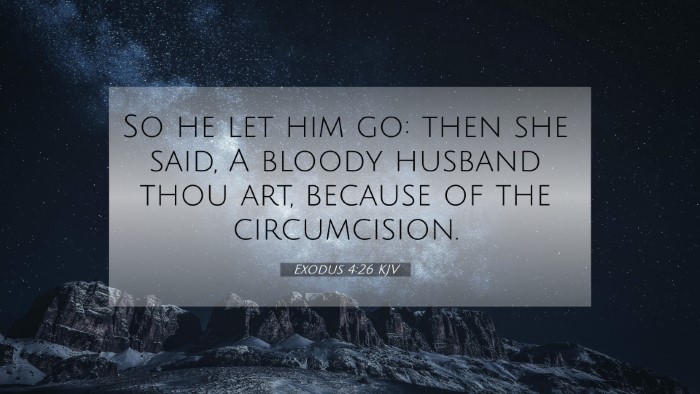Understanding Exodus 4:26
Exodus 4:26 states: "So He let him go. Then she said, 'You are a bridegroom of blood'—because of the circumcision." This verse captures a significant moment in the life of Moses and serves to illustrate themes of obedience and divine covenant.
Contextual Overview
This passage occurs during Moses' return to Egypt after encountering God in the burning bush. The Lord had commanded Moses to go and lead His people out of captivity. The sudden incident involving circumcision, which the verse alludes to, points to God's covenant with Abraham and the necessity of following this command as part of Moses' role.
Commentary Insights
Matthew Henry's Commentary
Matthew Henry emphasizes that this circumcision was crucial for Moses, as it represented a necessary obedience to God’s covenant. He highlights the importance of spiritual readiness and cleanliness when being called to God’s service. Neglecting this act could have resulted in divine retribution, emphasizing the seriousness of covenant obligations.
Albert Barnes' Notes
Albert Barnes provides insight into the cultural implications of this act. He notes that Zipporah’s reaction showcases her understanding of the significance of the covenant. Her words, "You are a bridegroom of blood," imply that blood must be shed to symbolize the covenant between God and His people. Furthermore, she understood that the physical act of circumcision was tied to spiritual fidelity.
Adam Clarke's Commentary
Adam Clarke offers a perspective on the emotional and relational dynamics between Moses and Zipporah. He points out that Zipporah’s action of circumcising their son was not merely an obligation but a protective measure, expressing a deep commitment to God and the covenant. Clarke also elucidates the tension between obedience to God and familial responsibilities, highlighting that Moses' mission required full commitment to God’s commands.
Thematic Connections
This verse, while seemingly straightforward, opens up a rich dialogue about the necessity of obedience to God's covenant. It invites exploration of several interrelated themes:
- Obedience: The need for Moses to adhere strictly to God’s commands.
- Covenant: The significance of blood in establishing a covenant.
- Family Dynamics: The balance between divine calling and family responsibilities.
- Spiritual Preparation: The concept of being spiritually ready for God’s service.
Related Bible Cross References
The following verses relate directly to the themes captured in Exodus 4:26:
- Genesis 17:10-14: Discusses the covenant of circumcision with Abraham.
- Exodus 12:43-49: Outlines the significance of covenantal practices in the Passover.
- Leviticus 12:3: Further explains the law of circumcision for Israel.
- Romans 2:29: Speaks to the spiritual significance of circumcision.
- Galatians 5:2-6: Relates to the continuing relevance of the covenant in Christ.
- Hebrews 9:22: Explains the necessity of blood for redemption.
- Acts 15:1-29: Discusses the early church’s understanding of the covenant and the law.
Concluding Insights
In summary, Exodus 4:26 offers profound lessons on obedience to God’s commands and the nature of covenant relationships. As seen through the combined insights of various commentaries, it emphasizes the urgent call for believers today to prioritize obedience in their spiritual lives, ensuring a deep connection with God's eternal covenant.
Exploring Cross-Referencing Methods
To delve deeper into the connections between these verses and others, utilizing a bible concordance or bible cross-reference guide can enhance one’s study. For those asking how to find cross-references in the Bible, various tools and systems are available to aid in identifying thematic connections. This not only enriches personal understanding but also aids in sermon preparation and theological discussions.
Final Thoughts
Embracing the practice of cross-referencing Biblical texts fosters a deeper understanding of scripture, opening up avenues for further study and insight into God's word.


